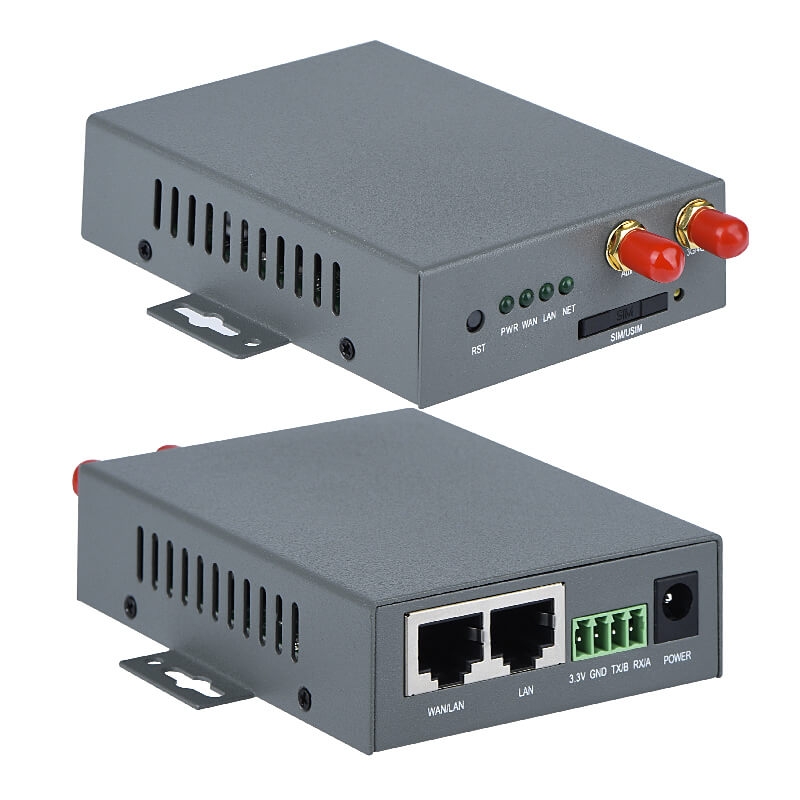The Power and Convenience of Industrial Wireless Router
2023.07.17 / By hqt
What is meant by an industrial wireless router?
- An industrial wireless router is a networking device made expressly for use in industrial settings. It is a focal point for connecting various components and facilitating wireless communication inside an industrial network. These routers are designed to survive challenging circumstances frequently present in industrial applications, such as extremely high humidity, severe temperatures, and electromagnetic interference.
- Manufacturing facilities, power plants, oil refineries, transportation networks, and warehouses are just a few industrial applications that may benefit from the dependable and secure wireless communication offered by industrial wireless routers. They frequently support a variety of wireless technologies, including Wi-Fi, cellular networks, and occasionally even exclusive wireless protocols.
- Industrial routers offer strong and flexible options for enterprises that need to link remote sites, equipment, and staff. These routers are built to survive harsh environments and offer improved security, long-range networking, and scalability. Manufacturing, transportation, and healthcare are just a few of the industries that can employ industrial wireless routers.
Benefits of an Industrial Wireless Router in the Connected World of Today:
Using industrial wireless router has several benefits in today’s digitally connected world, where companies primarily rely on automation and data transmission. These routers are essential to create dependable and secure wireless communication networks in industrial settings. In this post, we shall examine the benefits of industrial wireless routers and their relevance in contemporary industry.
- Mobility and Flexibility:
Industrial wireless router allows users to design wireless networks that may change with their surroundings. Wireless routers, as opposed to conventional wired networks, do not require physical connections, making it easier to relocate or reposition devices. This adaptability helps enterprises to improve operations, reorganize floor plans, and meet changing production demands.
- Scalability:
With the help of industrial routers, businesses may grow their wireless networks as necessary. Wireless routers can handle the additional demand without major infrastructure improvements when organizations expand and add more devices or locations to their network. This scalability offers affordable options for sectors that need flexibility and the capacity for future growth.
- Productivity gains:
Thanks to industrial routers, employees may stay connected and use vital data or systems from any location within the network’s coverage area. This link raises productivity by providing real-time communication, process monitoring, and control. Wireless routers enable staff to make rapid, informed choices, minimizing downtime and increasing overall productivity, whether accessing data, changing settings, or getting notifications.
These wireless routers make it possible for controllers, sensors, actuators, and other equipment to link to one another seamlessly—these routers lower installation and maintenance costs by doing away with substantial wiring and enabling wireless communication. Wireless communication also makes integrating with diverse industrial protocols and standards possible, facilitating interoperability between equipment made by various suppliers.

- Improved Mobility and Safety:
Wireless routers offer dependable and secure communication choices in industrial environments where personnel are frequently on the go. Mobile access to critical information, safety regulations, and emergency processes improve employee situational awareness and reaction times. In addition to supporting the installation of asset monitoring and location-based services, industrial wireless routers also facilitate effective resource management and improve worker safety.
- Remote Monitoring and Maintenance:
These wireless routers enable remote monitoring and maintaining systems, processes, and equipment. Without being physically present, on-site, technicians may access devices and solve problems using wireless communication. This feature minimizes operational costs, decreases downtime, and improves the effectiveness of maintenance. Additionally, remote monitoring allows for preventative maintenance through predictive maintenance, which analyses data from linked equipment to find probable breakdowns or anomalies.
- Enhanced Security:
Industrial routers are equipped with strong security features to safeguard sensitive data and stop unauthorized access. Security is a top priority in industrial contexts. These routers use encryption, authentication techniques, and secure protocols to protect wireless communications. Wireless routers further provide:
- Network segmentation and access control.
- Restricting access to particular network devices or regions.
- Enhancing security precautions.
- Cost Savings:
Compared to traditional wired networks, using wireless routers can result in considerable cost savings. Wireless infrastructure avoids requiring pricey ducts, cabling, and related installation expenses. Furthermore, wireless routers do not have cable wear and tear problems, so they cost less to maintain over time. Wireless networks’ flexibility and scalability enable cost-effective network expansion and reconfiguration by reducing the need for significant infrastructure improvements.
Key characteristics of the industrial wireless router:
- Ruggedness: Industrial routers are made to survive challenging conditions, such as resistance to water, vibration, dust, and temperature changes.
- Wide temperature range: They can function in various temperatures, from extremely cold to hot.
- Redundancy and failover: To ensure ongoing operation even in the case of a network breakdown, many industrial wireless routers feature redundancy and failover capabilities. They could enable dual-SIM capabilities for cellular networks and feature numerous WAN (Wide Area Network) connectors.
- Handle for industrial protocols: Some industrial routers come with specialized capabilities that enable them to handle industrial protocols like Ethernet/IP, Profibus, or Modbus, enabling easy interaction with industrial automation systems and devices.
- Remote management: Industrial wireless routers frequently come with this feature, which enables network managers to monitor and manage the router’s settings and connectivity remotely.
- Scalability: They are made to support several connected devices simultaneously, facilitating high data throughput and providing scalability for growing industrial networks.
- Secure connectivity: To ensure secure data transfer and guard against unauthorized access, industrial routers frequently include advanced security features, including VPN (Virtual Private Network) support, firewall protection, encryption, and authentication processes.
Conclusion:
An industrial wireless router is becoming increasingly common in today’s connected world. Businesses can ensure dependable, secure, high-speed internet access with the correct industrial wireless router. Since 2014, SAILSKY, a reputable producer, has specialized in creating wireless telecommunication network equipment. Our goal is to supply the globe with more top-quality wireless telecommunications equipment. We aim to establish ourselves as one of the top producers and solution providers of IoT communications equipment globally.

